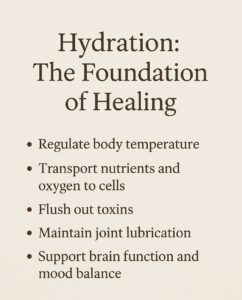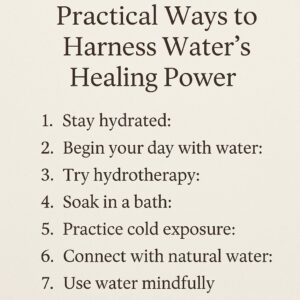Healing Power of Water: Unlocking Nature’s Remedy
Water — the most basic element of life — is often taken for granted in our fast-paced, modern world. Yet, beneath its simplicity lies a profound, often underappreciated force of healing and renewal. From ancient civilizations to modern scientific research, water has always been revered not just as a thirst quencher, but as a powerful natural remedy for the body, mind, and soul.
The Ancient Wisdom of Water Therapy
Cultures all across the world understood the healing potential of water long before spas and health centers made it fashionable. The ancient Indian medical system known as Ayurveda views water as sacred and uses it in a variety of ways, including hot, cold, and herbal, to balance the body’s doshas. Because they thought that taking a bath in a hot spring might heal illnesses and revitalize the soul, the ancient Greeks constructed ornate bathhouses. Misogi, or ritual cleaning with cold water, is a Japanese practice that stresses mental and body cleansing.
Superstition was not the only foundation of these customs. They realized that water has the ability to heal, cleanse, and rejuvenate on many levels—something that contemporary science is just now starting to measure.
#Hydration: The Foundation of Healing

Water is necessary for life at the cellular level. Water makes up around 60% of the human body, and each and every cell depends on it to function. Hydrating properly aids:
• Regulate body temperature
• Transport nutrients and oxygen to cells
• Flush out toxins
• Maintain joint lubrication
• Support brain function and mood balance
When we are even mildly dehydrated, we experience fatigue, headaches, poor concentration, and reduced immunity. Chronic dehydration has been linked to conditions like kidney stones, urinary tract infections, and even cognitive decline.
Drinking enough water daily is perhaps the simplest and most effective way to support healing — yet many people don’t get the recommended 8-10 glasses a day. Adding a pinch of sea salt or a squeeze of lemon can enhance absorption and provide additional minerals, turning a basic glass of water into a revitalizing tonic.
#Water and Emotional Wellbeing
Water and emotional well-being have a modest but significant relationship. Consider how, in times of stress, we naturally gravitate toward water—a soothing shower, a warm bath, or a stroll by the sea. It has been demonstrated that the sound of ocean waves or flowing water lowers the stress hormone cortisol and encourages relaxation.
Being submerged in water, particularly warm water, activates the parasympathetic nervous system, which controls digestion and sleep. This lowers blood pressure, slows the pulse rate, and promotes mental calmness. The use of water for pain reduction and treatment, or hydrotherapy, is widely accepted in both mental health therapy and physical rehabilitation.
#Cold Water Therapy: A Modern Revival
Advocates like Wim Hof and other wellness influencers have helped cold water immersion become more well-known in recent years. This procedure, also known as cryotherapy or cold plunging, is briefly exposing the body to cold water, usually between 10 and 15°C (50 and 59°F).
The benefits of cold water therapy include:
• Reduced muscle inflammation and faster recovery
• Enhanced circulation and cardiovascular function
• Boosted immune response
• Improved mental resilience and reduced anxiety
Scientific studies have shown that cold exposure activates brown fat (a type of fat that burns calories to generate heat), helps regulate blood sugar, and even triggers the release of endorphins — the body’s natural “feel-good” hormones.
It’s not just about physical health; many who practice cold plunges report a heightened sense of clarity, emotional balance, and even spiritual connection.
#Water as a Detoxifier
Detoxification is one of the most important functions of water. Water is essential for the removal of waste and toxins from the body by the kidneys, liver, and digestive system. These processes slow down when dehydrated, which can result in immune system weakness, weariness, and skin problems.
Water fasting and juice detoxes are utilized in holistic health circles to rest the digestive system and remove accumulated waste. The basic idea is still the same, even though these should only be carried out under expert supervision: our body’s natural cleansing processes may function at their peak when we drink plenty of pure, mineral-rich water.
Cleansing the body, promoting digestion, and supporting liver function can all be achieved by doing something as easy as drinking warm lemon water to start the day.
#Water and Skin Health
Hydration has a significant impact on the health of the skin, which is the biggest organ in the body. Consuming adequate water promotes a clear, radiant complexion, increases skin suppleness, and lessens dryness. External water use, such as steam, baths, or compresses, can reduce inflammation, heal wounds, and revitalize fatigued skin in addition to internal hydration.
Herbal, salt, or essential oil-infused baths offer an additional layer of healing and alleviate psoriasis, eczema, and muscle soreness. Soaking in water can have profound therapeutic effects, soothing the body and mind alike.
#Spiritual and Energetic Healing

Water is regarded as a purifying symbol and an energy conductor in spiritual traditions. Water’s capacity to purify both spiritually and energetically is reflected in rituals incorporating it, such as Tibetan water blessings, immersions in the Ganges, and baptism.
The Japanese researcher Masaru Emoto made the well-known assertion that water may convey emotion and purpose. According to his contentious studies, water subjected to positive energy—such as music or loving words—formed more exquisite crystals when frozen than water exposed to negative energy. Although his techniques are still up for debate, the fundamental idea—that water is more than simply substance but also memory—resonates with many.
One’s sense of connection to the divine, to nature, and to oneself can be strengthened by engaging in spiritual activities like mindful bathing or water meditation.
#Practical Ways to Harness Water’s Healing Power

Unlocking the healing potential of water doesn’t require expensive treatments. Here are simple ways to bring water therapy into your daily life:
1. Stay hydrated: Sip clean, filtered water throughout the day. Consider adding electrolytes or herbs for extra benefits.
2. Begin your day with water: A glass of warm lemon water can stimulate digestion and detoxification.
3. Try hydrotherapy: Alternate hot and cold showers to boost circulation and immunity.
4. Soak in a bath: Add Epsom salts, lavender oil, or herbs for a calming, detoxifying experience.
5. Practice cold exposure: A short cold rinse after a hot shower can invigorate the body and sharpen focus.
6. Connect with natural water: Visit a river, lake, or ocean. Even a brief walk near water can reset your nervous system.
7. Use water mindfully: Drink and bathe with intention. Visualize water washing away stress, pain, and negativity.
Conclusion: Returning to the Source
The therapeutic properties of water serve as a reminder to return to the simplicity of nature in a society where artificial solutions and high-tech fixes predominate. It provides regeneration on all levels of existence by nourishing, purifying, calming, and connecting.
Water can be your ally whether you’re looking for spiritual clarity, emotional equilibrium, or bodily healing. It’s about accepting water as a spiritual element, a teacher, and a healer, not just about being hydrated. We frequently rediscover our own rhythms when we listen to the rhythms of the river.
